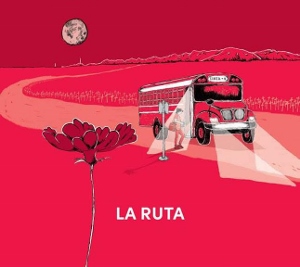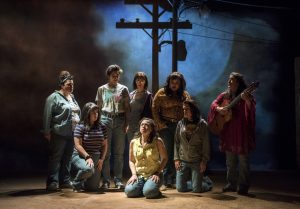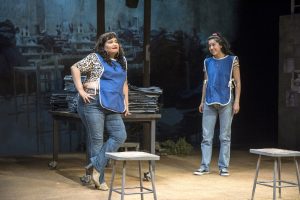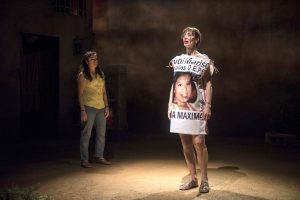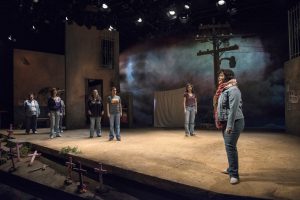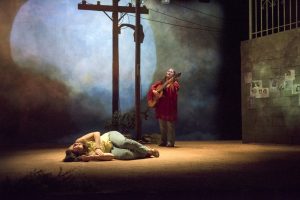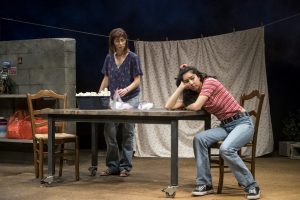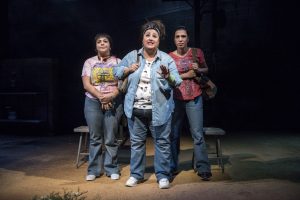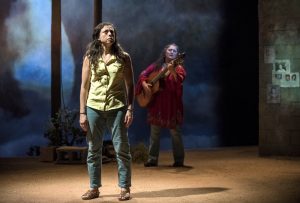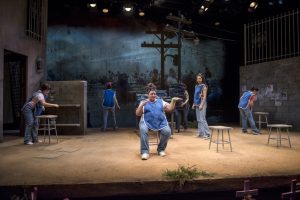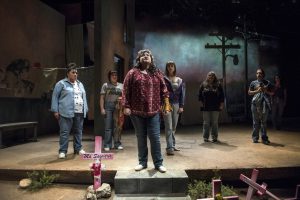A RUTA WAKENING
A play can be a cry for help — against a persistent peril, a former and future danger, a mindset that makes heartbreak. La Ruta, a Steppenwolf Theatre world premiere by Isaac Gomez, is all these and more. This 95-minute protest play both exalts and eulogizes Las Descomicidas, the disappeared Mexican women who take a bus “route” to work — and to death.
Fortified with five strong songs (including Cortés’s classic “Cielito Lindo”) and Rasean Davonte Johnson’s powerful projections, this one-act delivers a life-and-death world filled with accidental, almost folkloric, joys and all the concentrated suffering of Euripides’ Trojan Women.
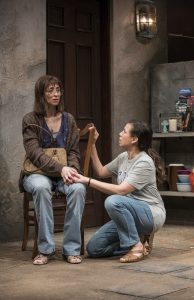 Gomez thought he knew his childhood home — Ciudad Juárez, the border town and sister city to El Paso, Texas. But he was only recently radicalized to its killing fields. Employed by U.S.-owned factories (opportunistic outgrowths of NAFTA) that overwork and underpay local women, these workers face a constant menace. They must travel to their jobs on crowded buses and dark and empty streets ripe with rapists, drug cartels, sex traffickers, and no security.
Gomez thought he knew his childhood home — Ciudad Juárez, the border town and sister city to El Paso, Texas. But he was only recently radicalized to its killing fields. Employed by U.S.-owned factories (opportunistic outgrowths of NAFTA) that overwork and underpay local women, these workers face a constant menace. They must travel to their jobs on crowded buses and dark and empty streets ripe with rapists, drug cartels, sex traffickers, and no security.
It’s no surprise that thousands have disappeared along this hellish ruta, their vanishings marked by pink, often anonymous, crosses, their murders often unavenged even if the culprits are caught. Called las locas de Juarez when their anger makes them unite to object, the survivors have become agitators against their nation in a search for justice that, like their lost lives, often comes up empty.
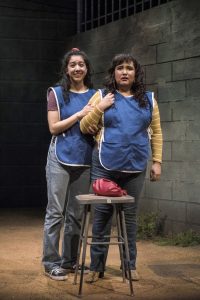 Denying that he’s written a “docudrama,” Gomez insists that every character on Steppenwolf’s Upstairs Stage is based on the sad stories of real women. La Ruta focuses on various months in 1998 and 2000 to create a microcosm of a slow-motion massacre. Sandra Marquez’s potent staging employs eight local Latina actresses to immense effect. Collectively and convulsively, they depict the survivor guilt, forged sisterhood, and anguished losses that speak for so many more.
Denying that he’s written a “docudrama,” Gomez insists that every character on Steppenwolf’s Upstairs Stage is based on the sad stories of real women. La Ruta focuses on various months in 1998 and 2000 to create a microcosm of a slow-motion massacre. Sandra Marquez’s potent staging employs eight local Latina actresses to immense effect. Collectively and convulsively, they depict the survivor guilt, forged sisterhood, and anguished losses that speak for so many more.
Chums since childhood, Marisela (Charín Alvarez) and Yolanda (Sandra Delgado) are mothers who, despite every protective instinct, will see their daughters consumed by this rotten Raza. (“The desert has swallowed our girls.”) They deal with disaster differently, activist Marisela by demonstrating and crushed Yoli by denial and rage against the factory-worker friend Ivonne (Karen Rodriguez) of her 16-year-old daughter Brenda (Cher Álvarez). She even turns on Marisela as if no one can share the same searing sorrow.
To chronicle a volatile mix of joys and agonies, the scenes alternate both before and after Brenda’s disappearance. We see tough-girl (and closet case) Ivonne instructing an open-hearted Brenda in distrusting the other seamstresses. We catch them enjoying Fourth of July fireworks from El Paso across the “border wall.” We see Ivonne dealing with the kidnapping of her sister and colleague and worse.
As Yolanda is fated to lose Brenda, Marisela is horrified by the murder of her daughter Rubi by a boyfriend who dismembers her, discards her in a trash bag in a dumpster — and will be acquitted of charges by the toxic “machista culture” that controls much of Mexico. Marisela now wears Rubi’s poster as a declaration of defiance.
Gomez is not afraid to use graphic language to drive home cruelties inflicted on women who just try to earn their bread, working 12 hours a day and six days a week. Their daily “caravan” instead becomes a death march, often ending in roadside crosses memorializing unfound corpses.
The play is so fearless it can only meet the audience half way. (At times here, it definitely helps to know Spanish.) This heartless city of Juárez both stands for nothing but itself — and for much more than Mexican misogyny.
Including cast members Alice da Cunha, Isabelle Gerasole, Laura Crotte, and Mari Marroquin, the performances — too weak a word for this much authenticity — cover every side of the stories: girlish delight, contagious fear, lethal loneliness, and the push and pull between solitude and solidarity. As happens when theater takes sides to tell truths, all differences disappear.
photos by Michael Brosilow
 La Ruta
La Ruta
Steppenwolf Theatre Company
Steppenwolf’s Upstairs Theatre, 1650 N Halsted St
ends on January 27, 2019
for tickets, call 312.335.1650 or visit Steppenwolf
for more shows, visit Theatre in Chicago
